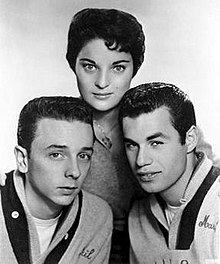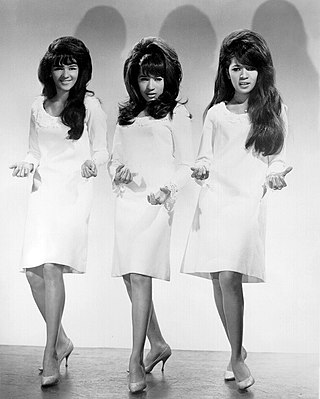
The Ronettes were an American girl group from Washington Heights, Manhattan, New York City. The group consisted of lead singer Veronica Bennett, her older sister Estelle Bennett, and their cousin Nedra Talley. They had sung together since they were teenagers, then known as "The Darling Sisters". Signed first by Colpix Records in 1961, they moved to Phil Spector's Philles Records in March 1963 and changed their name to "The Ronettes".

Peter and Gordon were a British pop duo, composed of Peter Asher and Gordon Waller (1945–2009), who achieved international fame in 1964 with their first single, the million-selling single "A World Without Love". The duo had several subsequent hits in America in the British Invasion era including "I Go to Pieces", "Lady Godiva", "Woman", "True Love Ways" and "Nobody I Know".
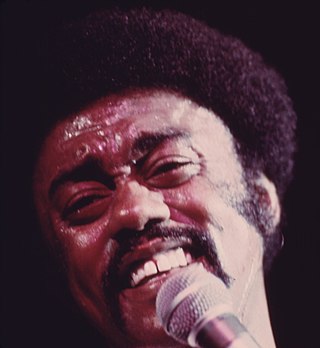
Johnnie Harrison Taylor was an American recording artist and songwriter who performed a wide variety of genres, from blues, rhythm and blues, soul, and gospel to pop, doo-wop, and disco. He was initially successful at Stax Records with the number-one R&B hits "Who's Making Love" (1968), "Jody's Got Your Girl and Gone" (1971) and "I Believe in You " (1973), and reached number one on the US pop charts with "Disco Lady" in 1976.

Kenneth George Boothe OD is a Jamaican vocalist known for his distinctive vibrato and timbre. Boothe achieved an international reputation as one of Jamaica's finest vocalists through a series of crossover hits that appealed to both reggae fans and mainstream audiences.
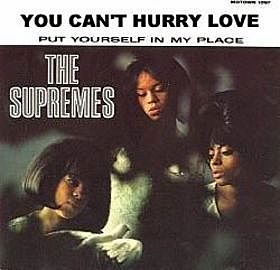
"You Can't Hurry Love" is a 1966 song originally recorded by the Supremes on the Motown label. It was released on July 25 of 1966 as the second single from their studio album The Supremes A' Go-Go (1966).
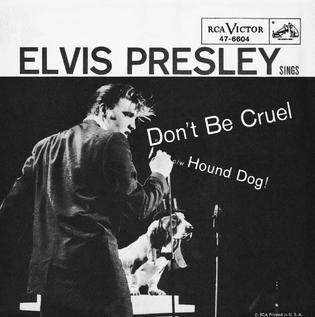
"Don't Be Cruel" is a song that was recorded by Elvis Presley and written by Otis Blackwell in 1956. It was inducted into the Grammy Hall of Fame in 2002. In 2004, it was listed #197 in Rolling Stone's list of 500 Greatest Songs of All Time.

"You've Lost That Lovin' Feelin'" is a song by Phil Spector, Barry Mann, and Cynthia Weil, first recorded in 1964 by the American vocal duo the Righteous Brothers. This version, produced by Spector, is cited by some music critics as the ultimate expression and illustration of his Wall of Sound recording technique. The record was a critical and commercial success on its release, reaching number one in early February 1965 in both the United States and the United Kingdom. The single ranked No. 5 in Billboard's year-end Top 100 of 1965 Hot 100 hits – based on combined airplay and sales, and not including three charted weeks in December 1964 – and has entered the UK Top Ten on three occasions.

Carol Connors is an American singer-songwriter. She is perhaps best known as the lead vocalist on the Teddy Bears' single, "To Know Him Is To Love Him", which was written by her bandmate Phil Spector.
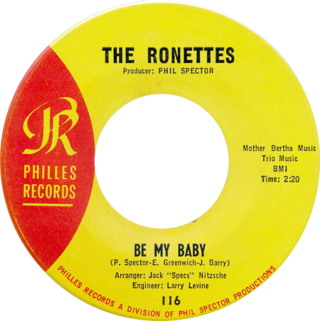
"Be My Baby" is a song by American girl group the Ronettes that was released as a single on Philles Records in August 1963. Written by Jeff Barry, Ellie Greenwich, and Phil Spector, the song was the Ronettes' biggest hit, reaching number 2 in the U.S. and number 4 in the UK. It is often ranked as among the best songs of the 1960s, and has been regarded by some publications as one of the greatest songs of all time.
"Chapel of Love" is a song written by Jeff Barry, Ellie Greenwich and Phil Spector, and made famous by The Dixie Cups in 1964, spending three weeks at number one on the Billboard Hot 100. The song tells of the happiness and excitement the narrator feels on her wedding day, for she and her love are going to the "chapel of love", and "[they'll] never be lonely anymore." Many other artists have recorded the song.

"It's My Party" is a song by American singer-songwriter Lesley Gore from her debut studio album I'll Cry If I Want To (1963). It was released as the lead single from the album on April 5, 1963, by Mercury Records. The song was collectively written by Herb Wiener, John Gluck Jr., and Wally Gold, while production was helmed by Quincy Jones.
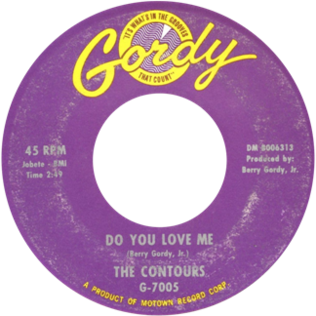
"Do You Love Me" is a rhythm and blues song recorded by the Contours in 1962. Written and produced by Motown Records owner Berry Gordy Jr., it appeared twice on the Billboard Hot 100 chart, reaching numbers three in 1962 and eleven in 1988.
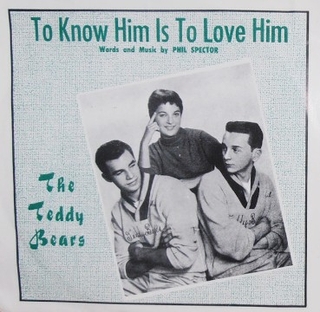
"To Know Him Is to Love Him" is a song written by Phil Spector, inspired by words on his father's tombstone, "To Know Him Was to Love Him." It was first recorded by the only vocal group of which he was a member, the Teddy Bears. Their recording spent three weeks at No. 1 on the Billboard Hot 100 chart in 1958, while reaching No. 2 on the UK's New Musical Express chart. Peter & Gordon and Bobby Vinton later had hits with the song, with its title and lyrics changed to "To Know You Is to Love You". In 1987, the song was resurrected by Dolly Parton, Linda Ronstadt, and Emmylou Harris, whose Trio recording topped the U.S. country singles chart.

The Blossoms were an American girl group that originated from California. During their height of success in the 1960s, the group's lineup consisted of Darlene Love, Fanita James, and Jean King.

"He's a Rebel" is a song written by Gene Pitney that was originally recorded by Vikki Carr and by the girl group the Blossoms. Produced by Phil Spector, the Blossoms' version was issued as a single credited to the Crystals, which topped the Billboard Hot 100 chart in November 1962. It was Spector's second chart-topper after "To Know Him Is to Love Him" (1958).
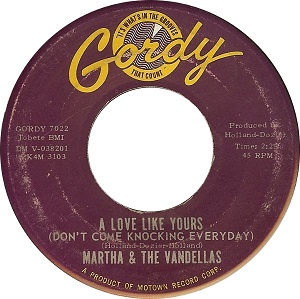
"A Love Like Yours (Don't Come Knocking Everyday)" is a 1963 song issued as the B-side to Motown singing group Martha and the Vandellas' hit single, "Heat Wave", released on the Gordy label.
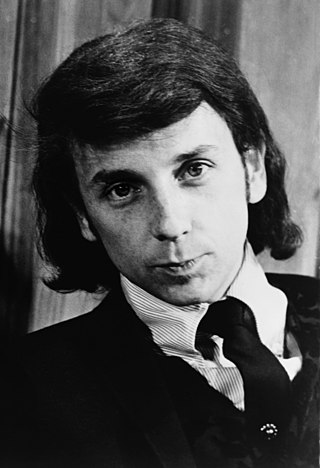
Harvey Phillip "Phil" Spector was an American record producer and songwriter best known for his innovative recording practices and entrepreneurship in the 1960s and his two trials and conviction for murder in the 2000s. Spector developed the Wall of Sound, a production style that is characterized for its diffusion of tone colors and dense orchestral sound, which he described as a "Wagnerian" approach to rock and roll. He is widely regarded as one of the most influential figures in pop music history and one of the most successful producers of the 1960s.

"I Love How You Love Me" is a song written by Barry Mann and Larry Kolber. It was a 1961 Top Five hit for the pop girl group The Paris Sisters, which inaugurated a string of elaborately produced classic hits by Phil Spector. Bobby Vinton had a Top Ten hit in 1968 with a cover version. The song has been recorded by many other artists over the years.

"Don't You Worry My Little Pet" is a song written by Phil Spector for the American pop quartet the Teddy Bears, of which he was a member. It was released in September 1958 as the B-side of the group's "To Know Him Is to Love Him", which topped the Billboard Hot 100.

The Complete Trio Collection is compilation album by American singer-songwriters Dolly Parton, Emmylou Harris and Linda Ronstadt. It brings together newly remastered versions of their two award-winning albums, 1987's Trio and 1999's Trio II, with a third disc compiling 20 alternate takes and unreleased material. It was released worldwide on September 9, 2016, by Rhino Entertainment. A stand-alone version of the third disc, titled Farther Along, was released separately on vinyl.
